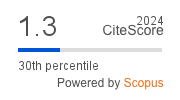Cytotoxicity of Betel leaf (Piper betel L.) against primary culture of chicken embryo fibroblast and its effects on the production of proinflammatory cytokines by human peripheral blood mononuclear cells
Downloads
Background: Betel leaf (Piper betel L.) has been used in modern and traditional medicine as antiseptic, antibacterial, and also prevention of plaque accumulation, but it still can stimulate cancer in lime-piper betel quid. Betel leaf also has anti-inflammatory properties. Purpose: The purpose of this study was examine the cytotoxicity of Betel leaf extract (BLE) against primary culture of chicken embryo fibroblast and its effects on the production of proinflammatory cytokines by peripheral blood mononuclear cells (PBMC) stimulated with LPS. Methods: MTT assay was used to investigate the survival rate of the culture with the survival rate result of the given culture extract 4%, 2% and 1% about 82%, 83.4% and 85%. There was no significant difference between treatment with various concentrations of the extract and the control (p>0.05). To evaluate the effect of Betel leaf extracts on the production of cytokines, proinflammatory was conducted by incubating the extracts of betel leaf with peripheral blood mononuclear cells stimulated with lipopolysaccharide. Peripheral blood mononuclear cells were obtained from healthy volunteers isolated by density centrifugation method using Ficoll-Hypaque. Once coupled with various concentrations of betel leaf extract and lipopolysaccharide, and then incubated for 24 hours, the culture supernatant was used to determine the level of IFN-γ and TNF-α by ELISA method. Results: It is known that the survival rates of BLE 4%, 2% and 1% were 82%, 83.4% and 85%. There was no significant of difference between several concentrations of BLE and those in the control group (p>0.05). The production of IFN-γ and TNF-α stimulated with LPS was no significant difference between BLE 4%, 2% and 1% and that in the control group (p>0.05). Conclusion: It can be concluded that BLE is not toxic against primary culture of chicken embryo fibroblast, and the production of IFN-γ and TNF-α by PBMC was not affected by BLE.
Latar belakang: Daun sirih (Piper betel L.) telah banyak digunakan dalam berbagai pengobatan tradisional maupun moderen sebagai antiseptik, antibakteri dan untuk pencegahan pembentukan plak, tetapi dapat juga menimbulkan kanker pada orang pengunyah sirih. Daun sirih juga memiliki aktivitas sebagai anti-inflamasi. Tujuan: Penelitian ini dimaksudkan untuk mengevaluasi sitotoksisitas ekstrak daun sirih terhadap kultur primer sel fibroblas embrio ayam dan pengaruhnya terhadap produksi sitokin proinflamasi oleh sel mononuklear darah perifer yang distimulasi dengan LPS. Metode: Uji MTT digunakan untuk menginvestigasi survival rate kultur, dengan hasil: survival rate dari kultur yang diberi ekstrak 4%, 2% dan 1% adalah 82%, 83,4% dan 85%. Tidak terdapat perbedaan signifikan antara perlakuan dengan berbagai konsentrasi ekstrak terhadap kontrol (p>0,05). Untuk mengevaluasi pengaruh ekstrak daun sirih terhadap produksi sitokin proinflamasi dikerjakan dengan menginkubasi ekstrak daun sirih bersama sel mononuklear darah perifer yang distimulasi dengan lipopolisakarida. Sel mononuklear darah perifer diperoleh dari relawan sehat yang diisolasi dengan metode sentrifugasi densitas menggunakan ficoll-hypaque. Setelah ditambah dengan berbagai konsentrasi ekstrak daun sirih dan lipopolisakarida, diinkubasi selama 24 jam, supernatan kultur digunakan untuk menentukan level IFN-γ dan TNF-α dengan metode ELISA. Hasil: Tidak terdapat perbedaan signifikan produksi IFN-γ dan TNF-α antara kultur sel mononuklear darah perifer yang diinkubasi bersama ekstrak daun sirih dibandingkan dengan kontrol (p>0,05). Kesimpulan: Disimpulkan bahwa ekstrak daun sirih "> tidak toksik terhadap kultur sel primer fibroblas embrio ayam dan tidak berpengaruh terhadap produksi sitokin proinflamasi IFN-γ dan TNF-α oleh sel mononuklear darah perifer manusia yang distimulasi dengan LPS.
Downloads
- Every manuscript submitted to must observe the policy and terms set by the Dental Journal (Majalah Kedokteran Gigi).
- Publication rights to manuscript content published by the Dental Journal (Majalah Kedokteran Gigi) is owned by the journal with the consent and approval of the author(s) concerned.
- Full texts of electronically published manuscripts can be accessed free of charge and used according to the license shown below.
- The Dental Journal (Majalah Kedokteran Gigi) is licensed under a Creative Commons Attribution-ShareAlike 4.0 International License

















